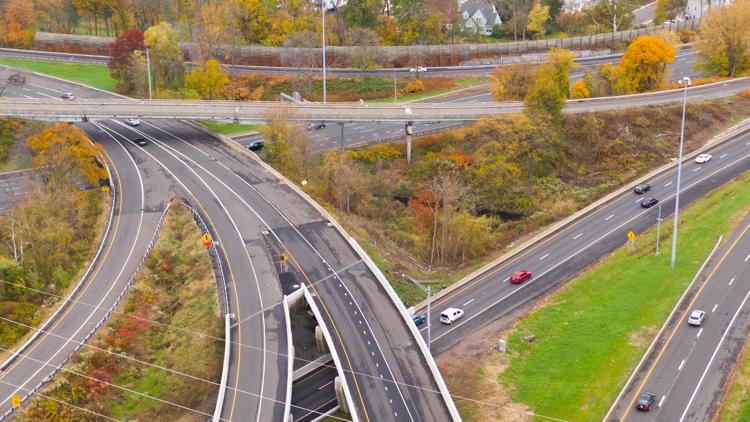CONNECTICUT, USA — Nearly $22 million is heading Connecticut's way to help local communities and infrastructure.
President Joe Biden and Transportation Secretary Pete Buttigieg announced that $21,852,800 would be allocated to projects in the state that are part of the Reconnecting Communities Pilot and Neighborhood Access and Equity grant programs. This is all part of Biden's "Investing in America" agenda.
The announcement states the funding aims to "reconnect communities cut off by transportation infrastructure decades ago, leaving entire neighborhoods without direct access to opportunities, like schools, jobs, medical offices, and places of worship."
The administration said the additional funding comes from the Inflation Reduction Act, making this investment 18 times larger than previous years' standalone Reconnecting Communities Pilot Program.
Buttigieg said that while transportation's purpose is to connect people, in too many places, past infrastructure decisions have served instead "to divide."
The money will be going to several communities in the state in the following ways:
Naugatuck
Connecting the east and west sides of Naugatuck and rail mitigation planning. This project will provide planning funding to construct a pedestrian connection that links Naugatuck's Metro-North Rail Line to the downtown part of the town and the Naugatuck River Greenway Trail and Route 8. Regarding the "pedestrian connections," the project's funds will be used to plan a connection that ties together the adaptive reuse of over 20 acres of brownfields downtown, including the construction of transit-oriented, mixed-rate/affordable housing.
The proposed connection with this program will include a 60-foot-long concrete underpass that tunnels beneath the rail line and a 183-foot pre-fabricated bridge for pedestrians that spans the length of the Naugatuck River. The administration said that this project would be funded by $652,800.
Bridgeport
Another project is $600,000 towards the BRIDGE study in Bridgeport. BRIDGE stands for Bringing Resilient, Interconnected Development as a Gateway to the East End. This study aims to address the barriers that Interstate 84, Seaview Avenue, Stratford Avenue, and Connecticut Avenue intersections create to isolate the city's east-end neighborhood. The study plans to analyze improvements for the portion of I-95 that splits the east end in two and isolates it from Downtown Bridgeport, Bridgeport Harbor, and Steelpointe Harbor.
The study will also review concepts for the entrance and exit ramps for the highway, including alternatives to remove or reduce barriers in certain areas to ensure reliable mobility options and access to economic opportunities for residents. It will also evaluate current and future uses and provide a forum for "robust public engagement" to better align transportation infrastructure with the goals and needs of the city's east end, with a focus on bikes and pedestrians.
Hartford
Hartford will receive $2 million for the Greater Hartford Mobility Study (GHMS). This study has four parts that aim to strengthen the city's connections to the Connecticut River and East Hartford and reconnect Downtown to the surrounding neighborhoods. The city's neighborhoods have been limited in their access to the rest of the city due to the barrier created by Interstate 91 in the 1940s and 50s. This project includes the preliminary engineering, environmental documentation, and public outreach portions of the project that will continue the vision for the region, the announcement said.
This project aims to "cap" I-91, which will increase access to essential destinations, including the riverfront, reduce noise pollution, add bike and pedestrian-focused riverfront boulevard on the cap, install a new multi-modal local bridge to East Hartford near underserved communities, and reconfigure Whitehead Highway as an "urban boulevard."
Norwalk
The MLK Community Reconnection Project in the city of Norwalk will receive $600,000. This project includes planning a study to provide strategic roadway improvements and creative solutions that involve public art, lighting, and landscaping to alleviate traffic concerns in the city. The study area includes the junction of Interstate 95 and Route 7. The Norwalk Redevelopment Agency proposes a planning study to make "multimodal" improvements to three facilities that cross the highway: An arterial (MLK Drive and West Avenue) along with an approximate 2-mile corridor, a minor street (Crescent Street) and a shared-use path (Norwalk River Valley Trail.
The southern edge of the study area has a commuter rail station (South Norwalk), while the north end has a bus transit hub. The project also aims to establish safe pedestrian, bike, and public transit routes while camouflaging the I-95 and Route 7 overpass junction to "reestablish a seamless connection between the MLK community, South Norwalk, Wall Street, and the larger city."
Stamford
The bulk of the money coming to Connecticut, $17 million, is going to Stamford for the West Side Neighborhood Connector Project. This project aims to improve connections between the community's underserved West Side neighborhood and Downtown Stamford, South End, and the Stamford Transportation Center.
This project will allow area residents to safely cross several "burdening" facilities and improve access to employment centers, education, transit, parks, and other community destinations.
Pedestrian safety upgrades include upgraded sidewalks, raised crosswalks, bump-outs, traffic signal improvements, and "wayfinding signage" to help people cross Tresser Boulevard, Greenwich Avenue, and Richmond Hill Avenue.
The proposed project will also include a new direct connection from the Mill River Greenway to the Stamford Transportation Center. This will allow West Side residents to safely reach the transit station with limited interaction with vehicles.
Western Connecticut Transit
Finally, $1 million will be geared towards the Western Connecticut Regional Transit Study. This study aims to address the challenges faced by the region's transit systems, including lower ridership, fiscal and operational challenges, and increased congestion on the region's roadways.
Barriers to access, mobility, and economic development in the region in the region have been tied to a need for increased service frequency where transit already operates, a need for door-to-door service in outlying communities like New Milford and Newtown, a general desire for on-demand public transportation in subareas of the entire region, and transit connections to other cities in adjacent areas where no or limited options are like Bridgeport and Waterbury.
--
The full list of Reconnecting Communities Pilot and Neighborhood Access and Equity awards can be viewed here.
--
Jennifer Glatz is a digital content producer at FOX61 News. She can be reached at jglatz@fox61.com.
Have a story idea or something on your mind you want to share? We want to hear from you! Email us at newstips@fox61.com
HERE ARE MORE WAYS TO GET FOX61 NEWS
Download the FOX61 News APP
iTunes: Click here to download
Google Play: Click here to download
Stream Live on ROKU: Add the channel from the ROKU store or by searching FOX61.
Steam Live on FIRE TV: Search ‘FOX61’ and click ‘Get’ to download.



